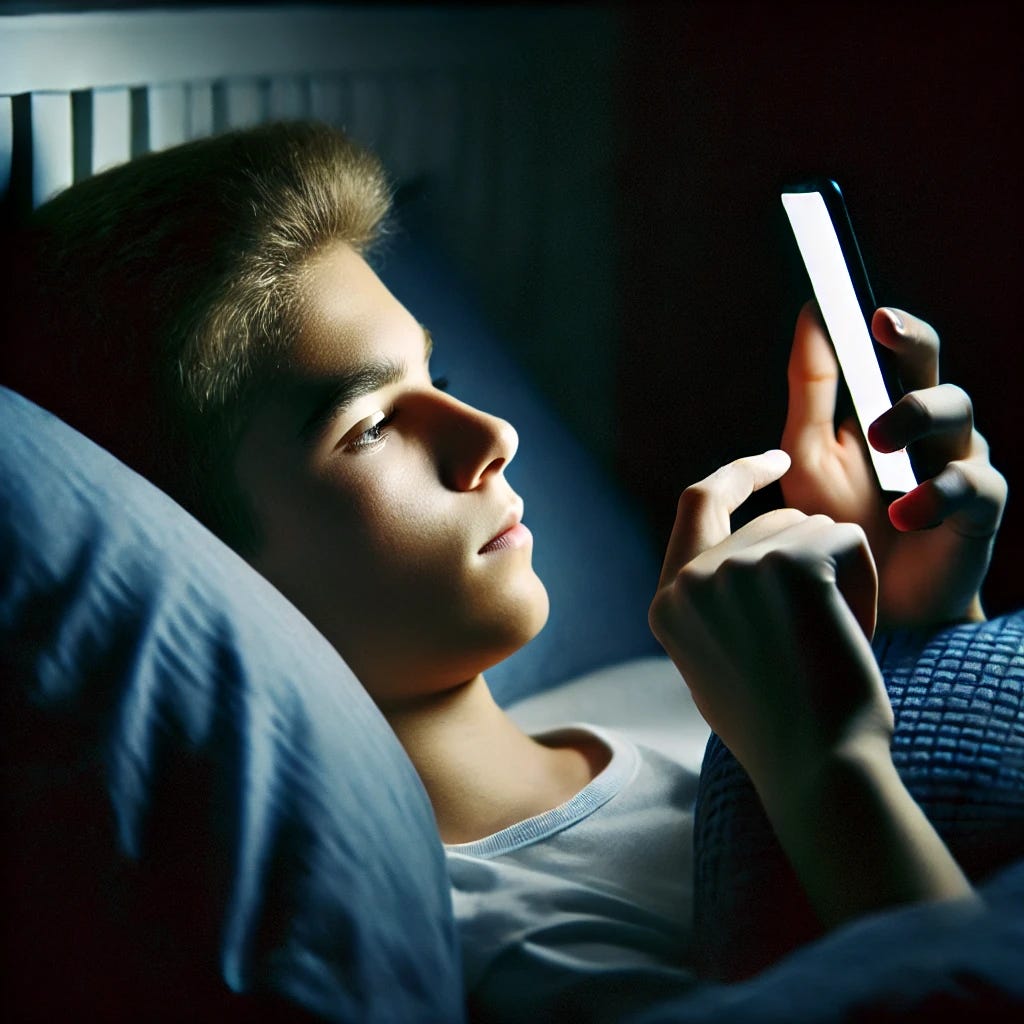The Quiet Rebellion: Reclaiming Your Mornings & Nights from the Attention Economy
How Big Tech Got You Addicted to Your Phone and What It’s Costing You
What’s the first thing you do when you wake up? Or the last thing before bed?
If you're like most people, you check your phone.
That little rectangle of glass and metal has quietly become the first and last thing we engage with every day—before we greet a partner, stretch, take a deep breath, or even fully wake up. This isn’t just a personal habit…it’s an engineered dependency.
And it didn’t happen by accident.
The Data Tells the Story
According to recent studies, a staggering majority of Americans sleep with their phones within reach:
71% of smartphone owners keep their phone on a nightstand, in their bed—or even in their hand.
62% of adults have their phones within arm’s reach while sleeping.
Among younger age groups, it’s even higher—90% of 18-29-year-olds sleep with their smartphones.
This isn’t just about convenience. It’s a result of decades of conditioning from tech companies who have made us believe that being disconnected, even for a moment, is risky, irresponsible, or impossible.
The Attention Economy: You Are the Product
We’ve been sold the idea that smartphones are essential, for productivity, connection, and even safety.
But here’s the truth:
Your phone isn’t the product. You are.
In the attention economy, your focus, time, and energy are the real currency.
Every moment you spend scrolling, tapping, and checking notifications is money in someone else’s pocket.
Social media, email, notifications, infinite scroll… all of it is designed to keep you engaged, not fulfilled.
The more time you spend looking at a screen, the more valuable you are to advertisers.
Tech companies don’t care about your sleep, mental clarity, or well-being.
They care about how many ads you see, how long you stay engaged, and how often you come back.
And when you check your phone first thing in the morning or last thing at night?
That’s prime real estate for their business model.
What’s the Cost of This “Convenience”?
We’re told that sleeping next to our phone is just modern life.
That it’s harmless, maybe even necessary.
But what are we actually giving up?
1. Our Sleep & Mental Clarity
Phones disrupt our sleep in ways that compound over time:
Blue light suppresses melatonin, delaying sleep onset and reducing REM.
Notifications and vibrations pull us out of deep sleep, even if we don’t consciously wake up.
Doom Scrolling or late-night emails keep the brain in work mode, making it harder to unwind.
By the time we wake up, our nervous system is already on edge, craving stimulation, and reacting instead of resetting.
2. Our Attention & Autonomy
When we wake up and immediately check our phone, we’re handing over the first moments of our day to someone else’s agenda.
Instead of checking in with ourselves, we check notifications.
Instead of setting our own priorities, we react to emails.
Instead of starting with intention, we get pulled into the endless loop of scrolling.
This isn’t just a bad habit. It’s a daily surrender of our autonomy.
3. Our Ability to Be Present
When was the last time you woke up without reaching for your phone?
Or went to bed without one last check?
Many of us can’t remember. And that’s the point.
The more ingrained the habit, the less we notice it.
We think we’re making a choice, but most of the time, we’re just following a well-worn dopamine loop designed to keep us hooked.
And every time we tell ourselves “just five more minutes”, we’re giving away something much bigger: our capacity to be present in our own lives.
The Quiet Rebellion: Taking Back Your Mornings & Nights
The good news?
You don’t have to delete all your apps, smash your phone, or move to a cabin in the woods to break free.
This isn’t about rejecting technology, it’s about reclaiming control.
If you want to wake up clear-headed instead of reactive, here are some simple shifts:
1. Move your phone across the room at night.
That extra distance makes it just inconvenient enough to stop mindless checking before bed or first thing in the morning.
2. Better yet, put it in another room.
I’ve been sleeping with my phone outside the bedroom for over a decade, and I’ll never go back.
The mental clarity is undeniable.
3. Replace your wake-up routine.
Choose two or three things to start your day before checking your phone:
Stretching or light movement
Journaling or setting daily intentions
Drinking water before caffeine
A few deep breaths before plugging into the outside world
Bonus points: Get some sunlight on your face.
Doing even some of these things every day has made me a better partner, colleague and human.
4. Swap scrolling for reading.
Instead of mindlessly refreshing your feed before bed, pick up a book.
Remember those?
Fiction, nonfiction, poetry—it doesn’t matter.
Let your brain unwind without the dopamine trap of infinite scroll.
5. Use an actual alarm clock.
If you’re using the excuse “I need my phone for an alarm”… well stop it.
A $10 alarm clock solves that.
This Is About More Than Sleep—It’s About Freedom
The Quiet Rebellion isn’t just about breaking phone habits.
It’s about taking back what’s ours:
Our attention.
Our mental clarity.
Our autonomy.
Tech companies have convinced us that staying constantly connected is normal, that checking our phone in bed is harmless, and that waking up to notifications is just life now.
But that’s not true.
The more we recognize the trade-offs we’re making, the more we can choose differently.
So here’s my challenge to you:
Try one of the shifts above for a week.
See what happens.
Notice how it feels.
And if you’ve already made changes, I’d love to hear: What’s worked for you? How do you reclaim your time?
Hit reply or drop a comment. Let’s swap ideas.
We don’t have to live like this anymore.
The Quiet Rebellion is growing.
In Solidarity,
Coach Nicholas Whitaker
nicholaswhitaker.com
changingwork.org
ps. If you’re struggling to do these kinds of things on your own, consider working with a coach. I’ve save my clients hundreds of hours of their time, and help them reclaim their energy and attention to focus on what matters most. I can help you too.






I just feel like I have to admit that I’m your target audience…as I read this before bed on my phone.
⏰ purchased! ✔️